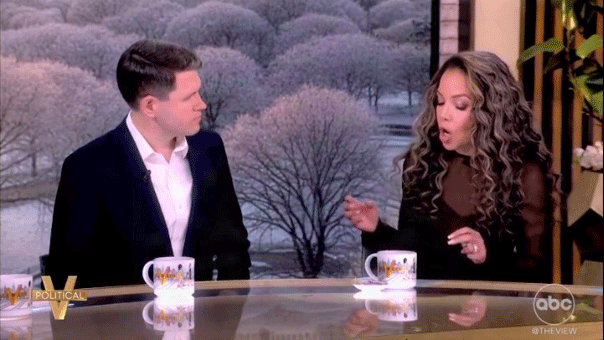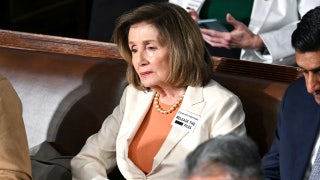Tucker Carlson speaks to Kyle Rittenhouse about Kenosha shootings
'Tucker Carlson Tonight' host speaks to the teenager about the events that led to his homicide trial.
In an exclusive interview with Fox News' Tucker Carlson, Kyle Rittenhouse spoke out about the night of the Kenosha riots that led to his arrest, as well as his eventual acquittal by jury and the angry reaction of the mainstream media and Democrats, including President Biden.
Rittenhouse, 18, was acquitted in the shooting deaths of two men, Anthony Huber and Joseph Rosenbaum, as well as the wounding of Gaige Grosskreutz, whom he shot through the right bicep after the protester pointed a pistol at him.
Rittenhouse told Carlson that he was staying at the home of a friend during the Kenosha riots and was mystified and troubled by the lack of resources provided to the police force in trying to quell the violence after the shooting of Jacob Blake.
"I'm not really sure [where the police presence was], because they have a hard job – but I didn't really think they got the support they needed," he said.
"The governor, Tony Evers, failed the community and there should have been a lot more resources to help with that."
Evers, a Democrat, was critiqued at the time by several observers including then-President Trump, for that perceived inaction as the Wisconsin city was engulfed in violence.
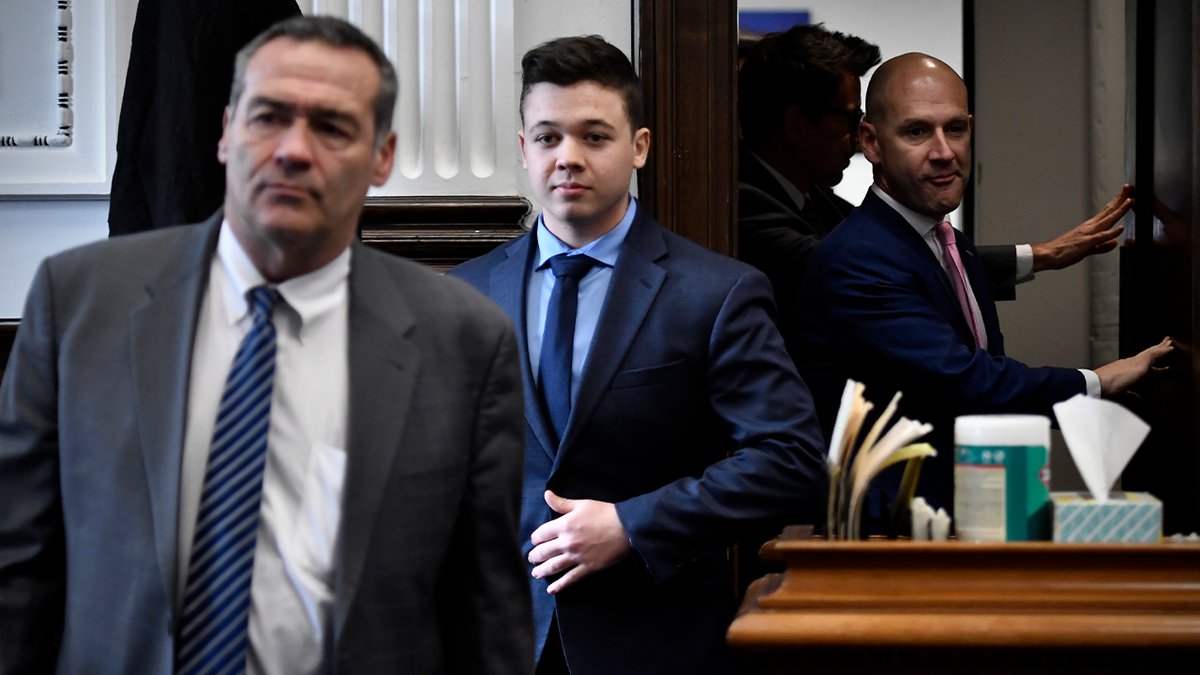
Kyle Rittenhouse, center, enters the courtroom with his attorneys Mark Richards, left, and Corey Chirafisi for a meeting called by Judge Bruce Schroeder at the Kenosha County Courthouse in Kenosha, Wisconsin. Police departments across the country said they were ensuring the right to peaceful protests following his not guilty verdict Friday. (Sean Krajacic/The Kenosha News)
Rittenhouse recalled the first time he saw Rosenbaum, who he noted he had never met, and was taken aback by the violent nature of the man.
Rosenbaum, a convicted child abuser, also appeared to unsettle nearby rioters at the time, Rittenhouse said.
"There was actually a second time [I encountered him and] he said to the group, he said, this is the second time he threatened to kill everybody -- He said, 'I’m going to f-ing kill you, I'm going to cut your hearts out you f-ing N-words.'"
When asked by Carlson, Rittenhouse remarked that the rioters were "dissociating with him because he was spewing the N-word around and they didn't seem to want to deal with him."
He then went on to recount the events that led to him shooting the three men, including Huber, who smacked him in the head with a skateboard.
Rittenhouse described how, after the shootings, he unsuccessfully attempted to surrender to Kenosha police officers stationed at a barricade down the street from where the incidents occurred.
One officer told him to "go home," which the teen told Carlson was likely because he did not hear him admit to shooting the rioters.
"I go back to CarSource Lot Number 2, and I tell everybody there what happened. I said, ‘I had to do it.’ I was just attacked. I was dizzy. I was vomiting. I couldn’t breathe," he said. "We couldn’t – I wanted to turn myself into the police in Kenosha but I wasn’t able to because they weren’t accepting visitors, apparently with the barricades and the fence up so we ended up turning myself into the Antioch police department."
Rittenhouse said his hometown police department, just south of the state line, is the closest law enforcement agency to Kenosha besides that city's barracks.
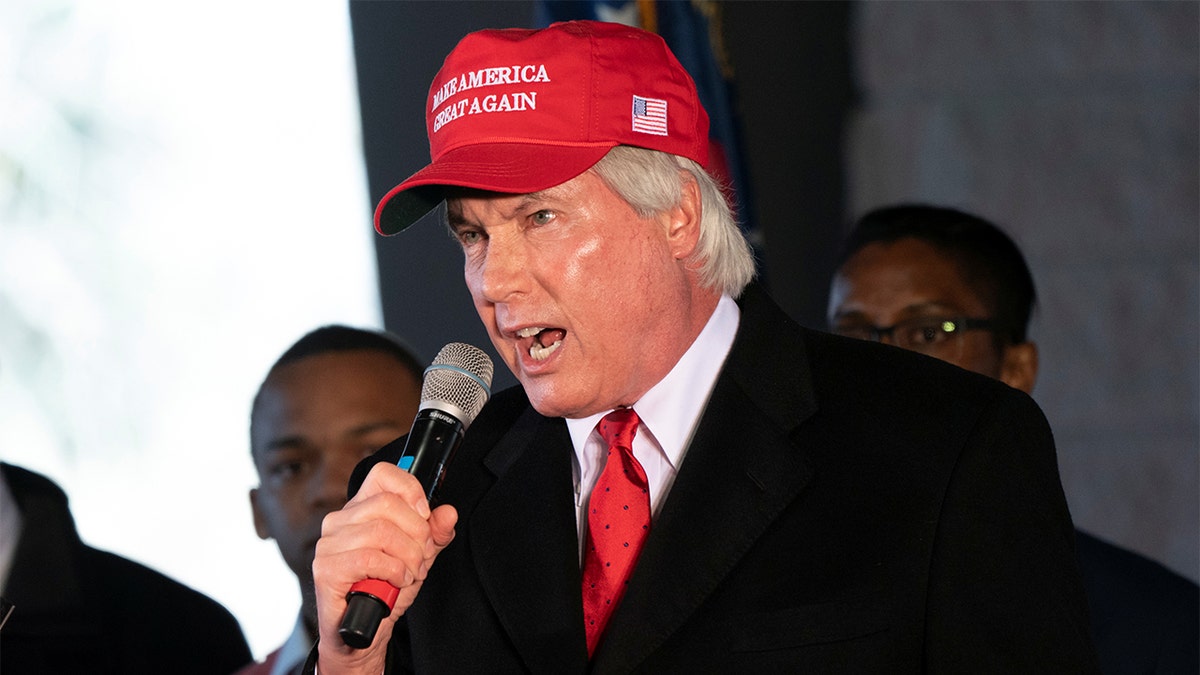
Attorney L. Lin Wood speaks during a press conference on election results in Alpharetta, Georgia, U.S., December 2, 2020. REUTERS/Elijah Nouvelage - RC2AFK9OXUW5 (Reuters)
The now-acquitted man went on to say he is not inherently political and "opportunists" took advantage of him.
"I agree with the BLM movement. I agree everybody has a right to protest and assemble -- but I do not agree that people have the right to burn down … American cities to try to spread their message," he said. "I think there are other ways to go around and do that."
Rittenhouse also criticized his initial counsel, high-profile attorney L. Lincoln Wood and co-counsel John Pierce, who he said took advantage of him and were at times incompetent.
"I was in jail for 87 days. Lin Wood was raising money on my behalf, and he held me in jail for 87 days – disrespected my wishes, put me on media interviews, which I should never have done … along with John Pierce; they said I was safer in jail instead of at home with my family."
Rittenhouse said that at one point, Pierce claimed Rittenhouse was in an "unorganized militia," which Rittenhouse called "blatantly false."
"I didn't know what a ‘militia' was.
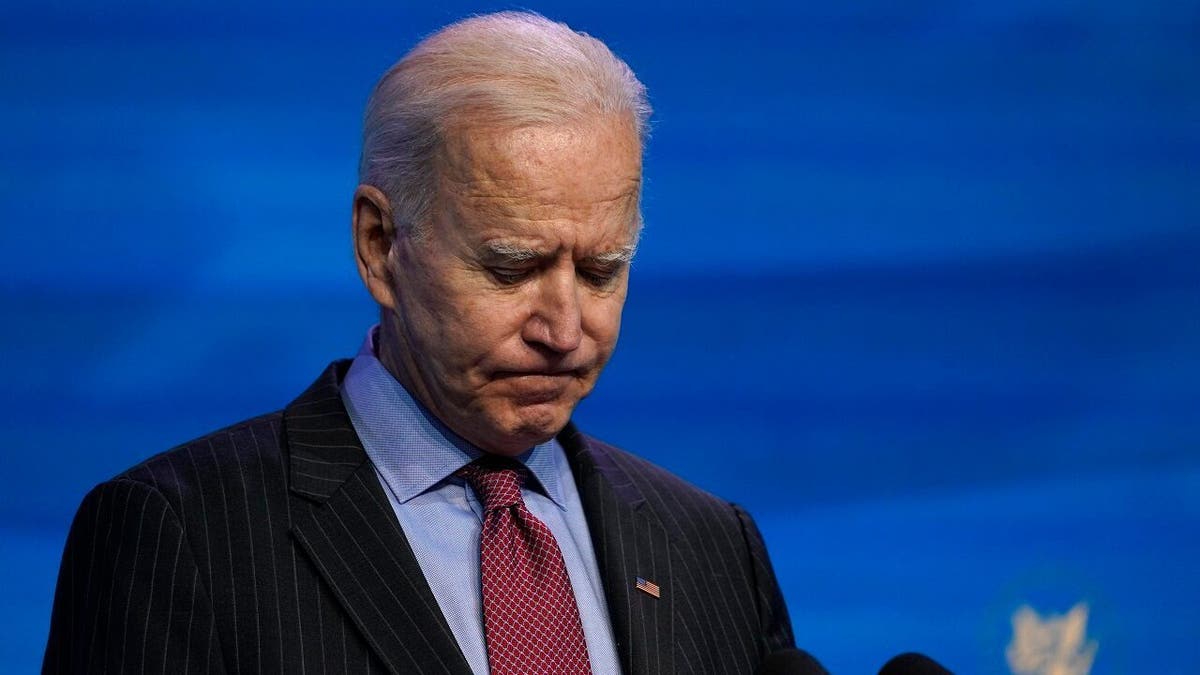
In this Jan. 8, 2021, file photo President-elect Joe Biden speaks during an event at The Queen theater in Wilmington, Del. (AP Photo/Susan Walsh, File)
"I was like, what the heck, and I’m like, no wonder people are saying I’m in a militia. It’s because he painted that narrative, which he should have never have gone there too," he told Carlson.
The 18-year-old, however, conversely praised his eventual counsel, Mark Richards and Corey Chirafisi.
Rittenhouse told Carlson he in some ways did not believe he as a person was truly on trial – given the way the case was covered.
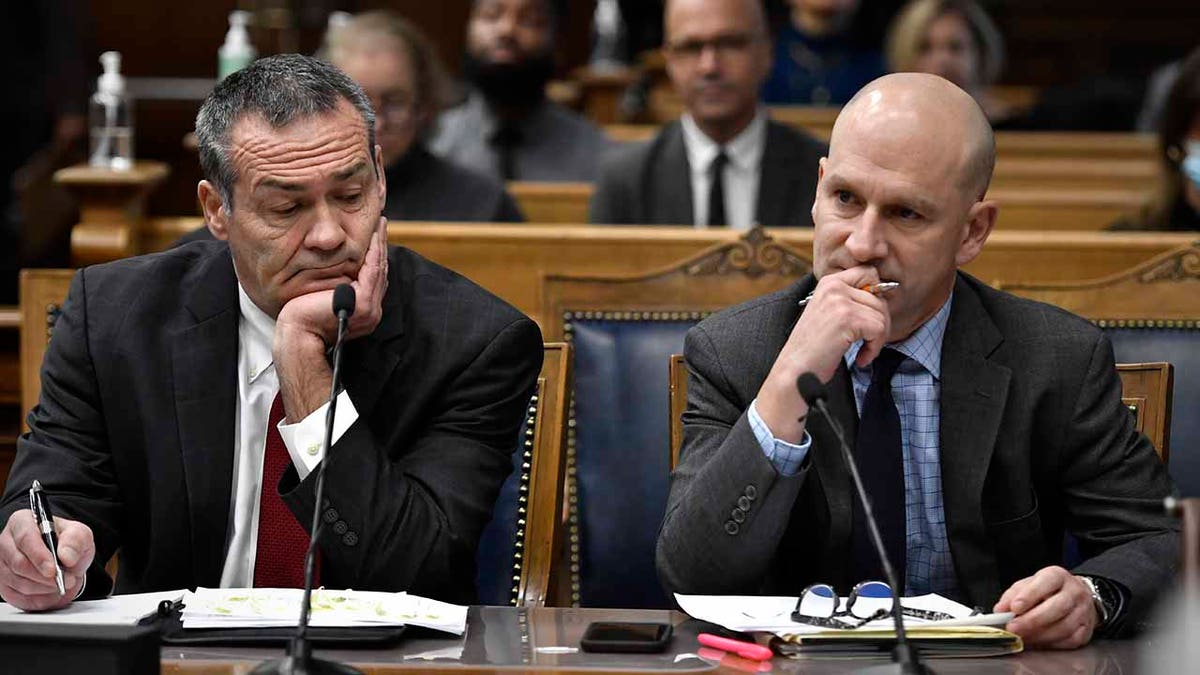
Kyle Rittenhouse's attorneys, Mark Richards, left, and Corey Chirafisi, listen as Judge Bruce Schroeder talks during the trial at the Kenosha County Courthouse in Kenosha, Wis., on Tuesday, Nov. 16, 2021. Rittenhouse is accused of killing two people and wounding a third during a protest over police brutality in Kenosha, last year. ((Sean Krajacic/The Kenosha News via AP, Pool))
"It was the right to self-defense on trial. If I was convicted, no one would ever be privileged to defend their life against attackers," he said. "Apparently to many people on the left, it is criminal to protect your community."
Rittenhouse further condemned Biden for prejudging him as a "White supremacist" in a 2020 campaign ad.
"Mr. President, if I could say one thing to you, I would urge you to go back and watch the trial, and understand the facts before you make a statement," the Illinois resident said.
"It’s actual malice; defaming my character for him to say something like that."
Biden was not alone in his accusations against Rittenhouse. During his trial, House Democratic Caucus Chairman Hakeem Jeffries, himself a critic of mass incarceration, declared on Twitter that Rittenhouse should be incarcerated and the key be "thow[n] away."
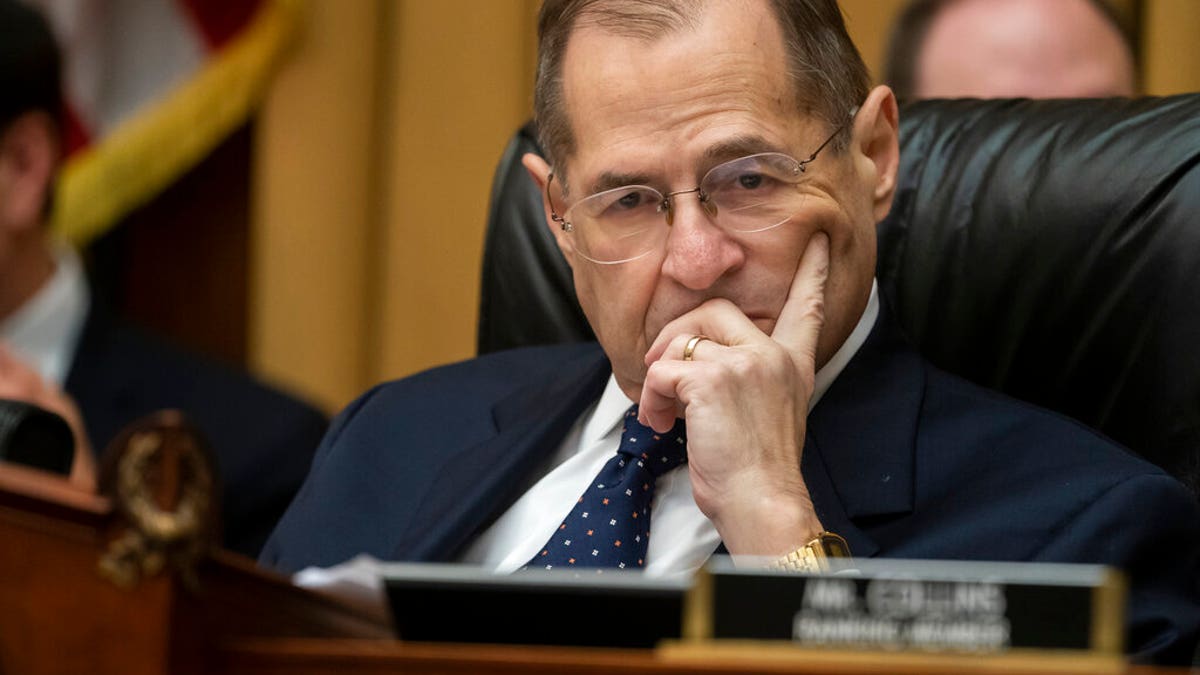
In this May 8. 2019 file photo, House Judiciary Committee Chair Jerrold Nadler, D-N.Y., moves ahead with a vote to hold Attorney General William Barr in contempt of Congress. (AP Photo/J. Scott Applewhite)
His fellow New Yorker Jerrold Nadler, a U.S. congressman from the Upper West Side who chairs the Judiciary Committee, questioned publicly whether the Justice Department should investigate the "precedent" he said was set in the case.
Pundits in the liberal media, including Joy Reid, Tiffany Cross and Elie Mystal, also condemned Rittenhouse.
Mystal, an attorney and writer for "The Nation" who frequently is an MSNBC guest, wrote a column claiming the teen "has gotten away with murder, as predicted" in a "White justice system working as intended."









